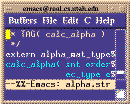 Alpha_1 Programmers's Manual
Alpha_1 Programmers's Manual
 Alpha_1 Programmers's Manual
Alpha_1 Programmers's Manual
Two other documents are available that detail procedures for c_shape_edit development. There is the C_shape_edit Programmer's Guide for information about writing applications using the c_shape_edit libraries, and there is the C_shape_edit Developer's Guide for information about extending and modifying c_shape_edit.
Objects in this class represent nodes in a dependency graph. The main contents of a model_obj are the "cons_fn," the function used to construct the object, the "prereqs," the prerequisite objects (the arguments to the constructor function), the "param," the resulting geometric object (a cache), and the "dependents," the model_obj's that depend on the given object as their prerequisites.
In addition to the methods for model construction and maintenance regarding dependency graphs, there are a number of static members (methods and data members) used to store state, provide various side effects, and wrap interfaces to other classes. These other classes provide specialized services (see below).
Value_obj is also used as a special case "value" for model_obj (model_obj::param()) to represent the basic data types (numbers and strings). (For example: x = 1.2; in SCL.)
stdin via the interpreter. The output of the interpreter
is written to stdout. C_shape_edit can be run from a UNIX
shell or under emacs with Alpha_1 "SCL-mode" support. The
main program is found in the $a$modeld directory.
 Alpha_1 Programmer's Manual Home Page
Alpha_1 Programmer's Manual Home Page